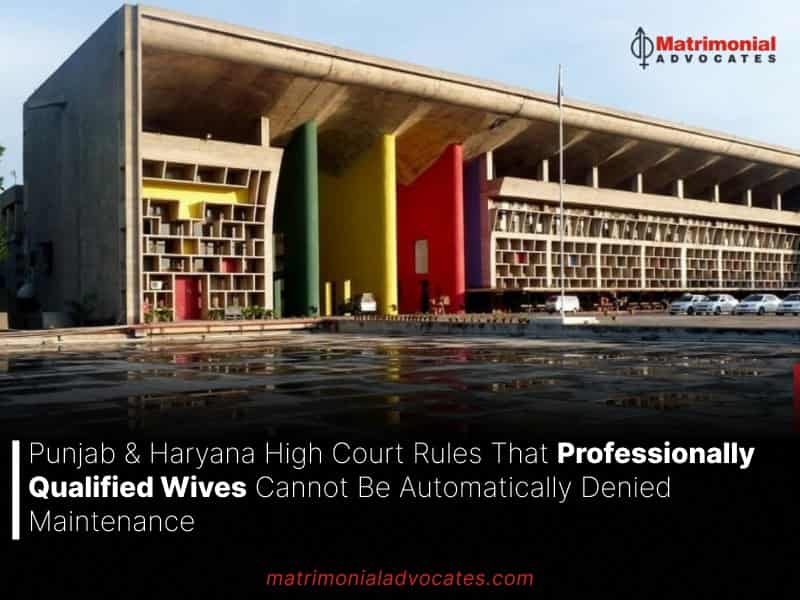
While opposing maintenance claims, a husband will have to prove that the wife had given up on a profession just for the sake of seeking maintenance, the Court said.
The Punjab and Haryana High Court recently held that a wife cannot be prevented from seeking maintenance solely based on her professional qualifications.
Justice Sumeet Goel stated that if a husband argues against a maintenance claim on these grounds, he must demonstrate that the wife had abandoned her profession solely to pursue maintenance.
“The wife merely by virtue of being educationally qualified cannot be held disentitled to seek maintenance, until and unless it is proved that she being professionally qualified, having taken up a profession, has given up on such profession, just for the sake of seeking maintenance,” the Court said.
Interestingly, another judge in the High Court recently pointed out that the maintenance provision under Section 125 of the Code of Criminal Procedure (CrPC) shouldn’t be misused by able-bodied wives who want to stay home without working.
However, Justice Goel took a different stance when considering a similar argument from a husband. He argued that his professionally qualified wife should not be able to sit idle and then ask for maintenance.
The Court found the husband’s argument misguided, stating that he hadn’t claimed his wife was working before she filed for maintenance.
It also observed that the family court had noted she was dedicating most of her time to caring for their child.
“The husband has miserably failed to prove any mala fide on the part of the wife in filing the petition for a grant of maintenance by giving up on her own professional income intentionally and deliberately,” it added.
In this case, the couple married in 2015 and had a child. Due to marital issues, the wife moved out and sought maintenance for herself and their minor son from the family court in 2018 under Section 125 of the CrPC.
In November 2023, the family court ordered the husband to pay ₹10,000 per month to the wife and ₹5,000 per month to the son. He was also instructed to continue covering the rent for the accommodation of both the wife and the minor child.
The husband challenged the order in the High Court, while the wife separately petitioned the court for an increase in the maintenance amount.
After reviewing the records, the Court rejected the husband’s argument that his wife had lost her right to maintenance because she chose to live separately without a valid reason.
It specifically addressed the husband’s claim that his wife was allegedly maintaining ongoing relationships with her male friends.
“There is no evidence to substantiate the wild allegations levelled by the husband to assassinate the character of the wife. The reference made on behalf of the husband to the letter…to contend that the wife through said document while admitting her fault has apologized for her conduct. Learned Family Court duly taking note of the said document has correctly held that the said documents have no significance in the facts of the case, as the said letter was written on 10.04.2016. However, the parties thereafter, have lived together for a substantial period and the petition for grant of maintenance was filed on 11.12.2018,” it said.
The Court also rejected the argument that the family court had failed to provide a formula for determining the maintenance amount. It stated that the maintenance figure was calculated by considering all the circumstances of the case.
In this regard, the Court also denied the wife’s request for an increase in maintenance.
“The maintenance amount of Rs.10,000/- per month to the wife and Rs.5,000/- per month to the son is not the only amount, husband is paying. Over and above the said amount he is paying the rent for the accommodation of the wife and son. The said rent is stated to be Rs.10,000/- per month in the year 2019, which was stated to have increased to Rs.14,300/- per month in the year 2023, and must have increase further with 10 % increase of rent per year qua the tenanted premises,” it found.
As a result, the Court upheld the family court’s decision and dismissed the petitions from both the husband and the wife.





